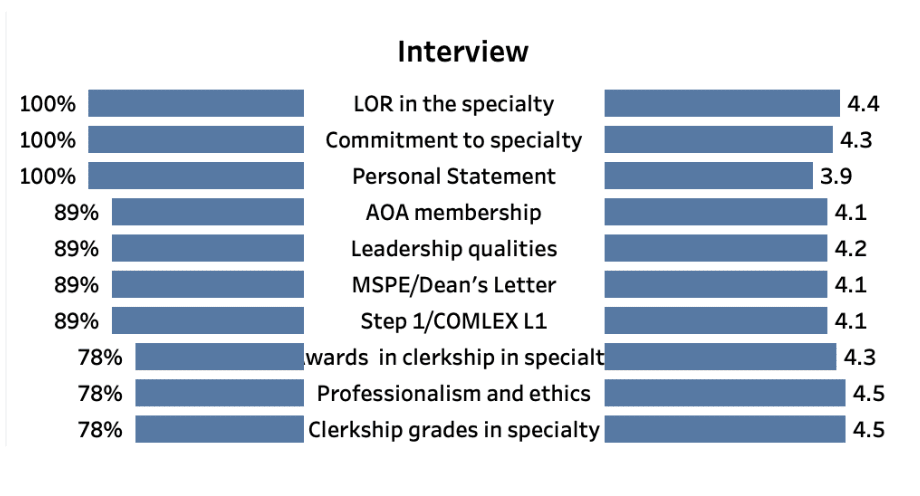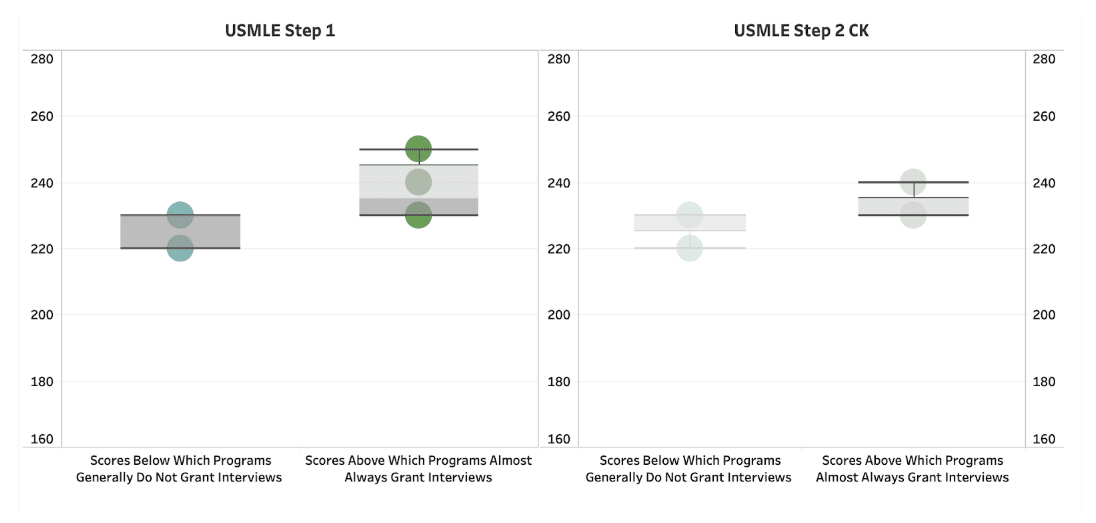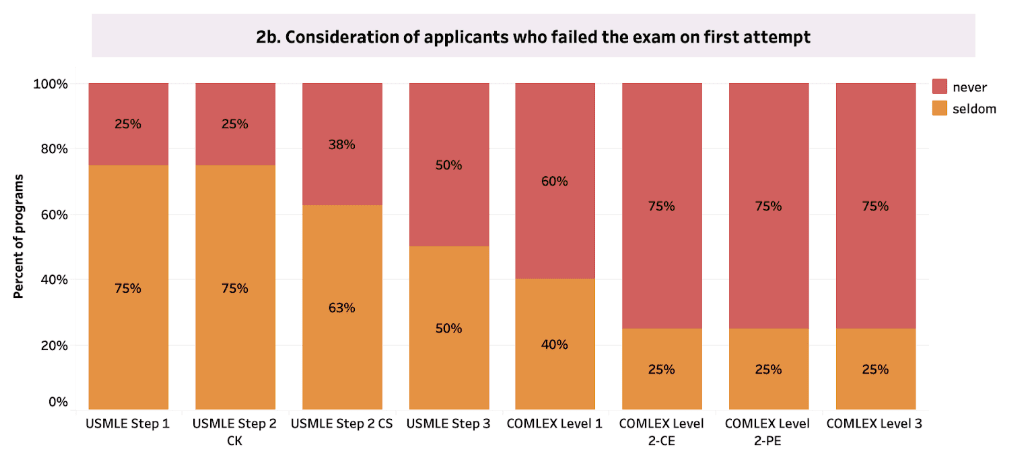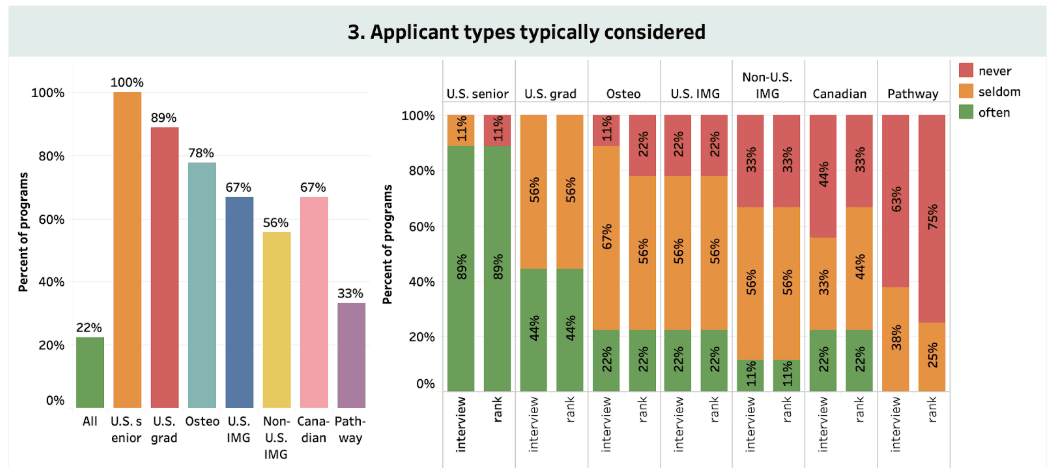Matching into Thoracic Surgery Residency

16325 Views
From the Viewpoint of a Program Director: What You Need to Match into Thoracic Surgery Residency
The NRMP conducted a survey to determine what factors Program Directors consider when deciding which candidates to interview and rank for their thoracic surgery residency program. The results were compiled into a “at a glance” tool, which is extremely helpful in gauging where your application packet stands compared to the applicant pool, and whether adding additional components, like a letter of recommendation (LOR) in the specialty, could give you a leg up as programs review your application.
The interactive tableau tool can be found here, and we recommend taking a look at the specialty you’ll be applying to before submitting your ERAS packet: https://public.tableau.com/profile/national.resident.matching.program#!/vizhome/PDSurvey_0/Desktoptablet
For Thoracic Surgery Residency specifically, major components of the survey you should pay attention to include:
- Selection Criteria for an Interview – LOR in the specialty is a MAJOR factor, while a strong personal statement pertaining to your interests in the field and commitment to the specialty are also highly recommended.
- Step 1 and Step 2 Scores:
- Step 1 – Score
-
-
- 245+ looks like a very solid score in Thoracic Surgery, with the median being 235.
- Range programs do NOT typically offer interviews: 220-230 seems to be the minimum threshold we would recommend for having a good chance at enough interviews. If you’re below 220-230 range, we suggest having a back-up specialty you could consider.
- Range programs DO typically offer interviews: 240+ seems to be the range at which you can feel comfortable in being offered interviews by a decent number of programs. If you’re in the 250+ range, you can likely be selective about where you apply.
- If you failed USMLE Step 1 follow these steps.
-
- Step 2CK – Score
-
-
- 230-240 seems to be the minimum threshold at which programs will grant interviews
- Scores below 230 generally will place you in an unfavorable position to receive an interview
-
- Step 2 CK – Timing of Taking the Exam
- Only 20% of programs required at least passing CK, although we do expect this number to grow. You can wait to take Step 2CK until after you have submitted ERAS.
- Failing Step 1 is more likely to be a show stopper:
- Failing Step 1 is a BIG deal in ANY specialty, and this is especially relevant in Thoracic Surgery. 25% of Thoracic Surgery programs will NOT consider you if you’ve failed Step 1, and 25% will NOT consider you if you’ve failed Step 2. So, if you’ve failed an exam, you can still apply, but you should definitely consider applying to another specialty like general surgery due to the limited number of programs and spots in Thoracic Surgery. 75% of programs seldomly consider applicants who have failed Step 1 and Step 2.
- Types of Applicants Considered:
- International Grads (U.S. and non-U.S.) are more likely to have difficulty matching into Thoracic Surgery: There are about 10-20% of programs that consider interviewing or ranking IMGs (U.S. and non-U.S.) on a routine basis. 56% consider U.S. IMGs seldomly, and 22%% never consider an IMG for an interview or rank. If you are a non-US IMG, the chances are even lower, with nearly 33% of programs never considering such an applicant. We recommend doing your homework to determine which programs may be more likely to consider IMGs, and definitely recommend a back-up specialty to apply into such as general surgery.
- Osteopathic graduates may have a chance to match into Thoracic Surgery: 22% of programs will routinely interview DO applicants and routinely rank them. 11 % of programs will never interview & 22% will never rank a DO applicant. With the remaining 56-67% that seldom consider DO applicants, it is very important to do your research to identify these programs so that you can best increase your chances of matching.
- Interviewees Get Ranked!: If you get an interview invitation, you are very likely to end up on the rank list if you interview. We recommend ranking at least 8-10 programs, so once you receive 10 interview invitations, you can feel okay with starting to prioritize and cancel as more come in given you are likely to get ranked.
- Expect to receive interview invitations in October & November: 80% of the interview invitations will be sent out during these two months. Expect to hear very little from thoracic surgery programs after the first month that you submit your ERAS.
- Expect to interview in December/January or later: Only 1/3 of interviews will occur before December, which gives you ample time to prepare. For further discussion on how to prep for your interview, see our blog post on how to Crush your Residency Interview: https://elitemedicalprep.com/preparing-for-your-residency-interview/
After you’ve browsed your specialty, take a look at a few other specialties and note what’s NOT important for Thoracic Surgery:
-
- Step 2 isn’t particularly important in Thoracic Surgery
- The MSPE/Dean’s letter isn’t particularly important for Thoracic Surgery
- Clerkship grade in specialty/awards in clinical clerkships isn’t as important in Thoracic Surgery as in other specialties
Summary for Thoracic Surgery Residency Applications:
- A solid thoracic surgery application would include a 245+ on Step 1, 235+ on Step 2, a LOR from 1-3 thoracic surgeons, and evidence of commitment to the specialty (i.e. multiple visiting rotations & research). In addition, a strong personal statement is important to the program directors.
- Thoracic surgery does not seem particularly IMG friendly, but it certainly is possible to match as an IMG if you do your research to identify programs with active IMG residents and establish proper connections.
- If you’ve failed an exam, you can still apply in thoracic surgery, but you should apply very broadly and apply to a back-up specialty.
- Expect Interviews in December-January. Reach out to programs you have high interest in if you haven’t heard from them by mid-December. Once you have about 10 interview invitations, you can consider being a bit more selective about which ones you actually take (but not before).
Good Luck! ☺
Wondering about your chances of matching into other specialties for residency? Check out our analysis of the NRMP directors survey “at a glance” tool for areas including anesthesia, neurology, family medicine, transitional year, psychiatry, emergency medicine, and more under the Residency Applications category of our blog! If you need further or specialized assistance understanding which residency specialties you are best suited to apply to, you can contact us or visit our residency advising page to learn more about how Elite Medical Prep residency advising services.
Featured Articles




